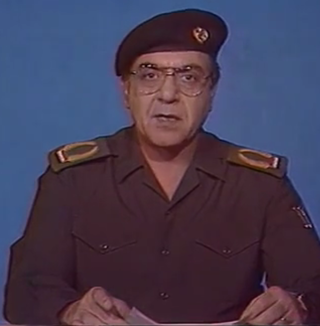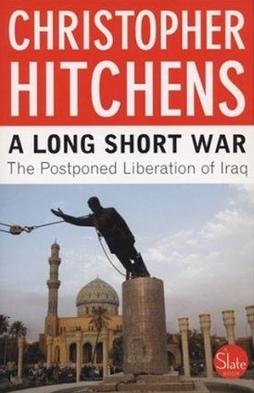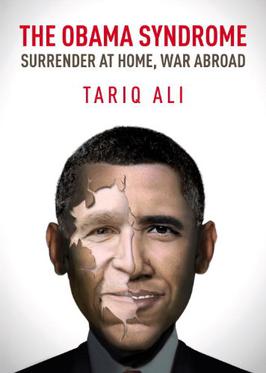
Tariq Aziz was an Iraqi Assyrian politician who served as Deputy Prime Minister (1979–2003), Minister of Foreign Affairs (1983–1991) and a close advisor of President Saddam Hussein. Their association began in the 1950s when both were activists for the then-banned Arab Socialist Ba'ath Party. He was both an Arab nationalist and a member of the Chaldean Catholic Church.

Ghazi ibn Faisal was King of Iraq from 1933 to 1939 having been briefly Crown Prince of the Kingdom of Syria in 1920. He was born in Mecca, and was the only son of Faisal I. He died in a car crash in 1939.

The 2003 invasion of Iraq was the first stage of the Iraq War. The invasion began on 20 March 2003 and lasted just over one month, including 26 days of major combat operations, in which a United States-led combined force of troops from the United States, the United Kingdom, Australia and Poland invaded the Republic of Iraq. Twenty-two days after the first day of the invasion, the capital city of Baghdad was captured by coalition forces on 9 April after the six-day-long Battle of Baghdad. This early stage of the war formally ended on 1 May when U.S. President George W. Bush declared the "end of major combat operations" in his Mission Accomplished speech, after which the Coalition Provisional Authority (CPA) was established as the first of several successive transitional governments leading up to the first Iraqi parliamentary election in January 2005. U.S. military forces later remained in Iraq until the withdrawal in 2011.

Mohammed Saeed al-Sahhaf is an Iraqi former diplomat and politician. He served as Minister of Foreign Affairs from 1992 to 2001. He came to worldwide prominence around the 2003 invasion of Iraq, during which he was the Minister of Information under Iraqi President Saddam Hussein, acting as spokesman for the Arab Socialist Ba'ath Party and Saddam's government. He has also been nicknamed Baghdad Bob or Comical Ali for his notable and colorful television appearances as the Information Minister of Iraq.

Hillah, also spelled Hilla, is a city in central Iraq. On the Hilla branch of the Euphrates River, it is 100 km (62 mi) south of Baghdad. The population was estimated to be about 455,700 in 2018. It is the capital of Babylon Province and is situated in a predominantly agricultural region which is extensively irrigated with water provided by the Hilla canal, producing a wide range of crops, fruit and textiles. Its name may be derived from the word "beauty" in Arabic. The river runs in the middle of the town, and it is surrounded by date palm trees and other forms of arid vegetation, reducing the harmful effects of dust and desert wind.
Events in the year 2002 in Iraq.

The Fist of God is a 1994 suspense novel by British writer Frederick Forsyth, with a fictitious retelling of the Iraqi Project Babylon and the resulting "supergun".

The Bush–Blair 2003 Iraq memo or Manning memo is a secret memo of a two-hour meeting between American President George W. Bush and British Prime Minister Tony Blair that took place on 31 January 2003 at the White House. The memo purportedly shows at that point, the administrations of Bush and Blair had already decided that the invasion of Iraq would take place two months later. The memo was written by Blair's chief foreign policy adviser, David Manning, who participated in the meeting.

The Iraq War, also referred to as the Second Gulf War, was a prolonged conflict in Iraq lasting from 2003 to 2011. It began with the invasion by a United States-led coalition, which resulted in the overthrow of the Ba'athist government of Saddam Hussein. The conflict persisted as an insurgency arose against coalition forces and the newly established Iraqi government. US forces were officially withdrawn in 2011. In 2014, the US became re-engaged in Iraq, leading a new coalition under Combined Joint Task Force – Operation Inherent Resolve, as the conflict evolved into the ongoing insurgency.

A Long Short War: The Postponed Liberation of Iraq is a collection of twenty-two articles originally written by Christopher Hitchens for the online magazine Slate. The articles support the impending American-led invasion of Iraq and were written between November 7, 2002 and April 18, 2003.
Capital punishment in Iraq is a legal penalty. It was commonly used by the government of Saddam Hussein, was temporarily halted after the US-led 2003 invasion of Iraq that deposed Hussein, and has since been reinstated. Executions are carried out by hanging.

Iraqi–Italian relations are the interstate ties relations between Iraq and Italy. Iraq has an embassy in Rome and Italy had an embassy in Baghdad and a consulate-general in Basra.

Babylon was an ancient city located on the lower Euphrates river in southern Mesopotamia, within modern-day Hillah, Iraq, about 85 kilometres south of modern day Baghdad. Babylon functioned as the main cultural and political centre of the Akkadian-speaking region of Babylonia. Its rulers established two important empires in antiquity, the 19th–16th century BC Old Babylonian Empire, and the 7th–6th century BC Neo-Babylonian Empire. Babylon was also used as a regional capital of other empires, such as the Achaemenid Empire. Babylon was one of the most important urban centres of the ancient Near East, until its decline during the Hellenistic period. Nearby ancient sites are Kish, Borsippa, Dilbat, and Kutha.
The National Progressive Front was an Iraqi popular front announced on 16 July 1973 and constituted in 1974, ostensibly formed within the framework of a "joint action programme" to establish a coalition between the Arab Socialist Ba'ath Party, the Iraqi Communist Party, the Kurdistan Revolutionary Party, a pro-government section of the Kurdistan Democratic Party, and miscellaneous independents. The Iraqi Communist Party were removed from the NPF in 1979 while the Kurdish Democratic Party suffered restrictions when Saddam Hussein came to power after 1979. The creation of the Front ensured the leading role of the Ba'athists in state and society whilst allowing limited autonomy for other participating parties loyal to the government. Saddam spoke of it once as "one of the essential forms to voice our will and to deepen democracy and political participation of the people and the national forces in building the new experiment in all fields." In effect the Front was controlled and maintained solely by the Ba'ath, with all other legal political forces acting in subservience to it.

Tariq Ali is a Pakistani-British political activist, writer, journalist, historian, filmmaker, and public intellectual. He is a member of the editorial committee of the New Left Review and Sin Permiso, and contributes to The Guardian, CounterPunch, and the London Review of Books. He read Philosophy, Politics, and Economics at Exeter College, Oxford.

Rough Music: Blair, Bombs, Baghdad, London, Terror is a 2005 book by British-Pakistani writer, journalist, political activist and historian Tariq Ali.

The Obama Syndrome: Surrender at Home, War Abroad is a 2010 book by British-Pakistani writer, journalist, political activist and historian Tariq Ali.
The timeline of the Gulf War details the dates of the major events of the 1990–1991 war. It began with the Iraqi invasion of Kuwait on 2 August 1990 and ended with the Liberation of Kuwait by Coalition forces. Iraq subsequently agreed to the United Nations' demands on 28 February 1991. The ground war officially concluded with the signing of the armistice on 11 April 1991. However, the official end to Operation Desert Storm did not occur until sometime between 1996 - 1998. Major events in the aftermath include anti-Saddam Hussein uprisings in Iraq, massacres against the Kurds by the regime, Iraq formally recognizing the sovereignty of Kuwait in 1994, and eventually ending its cooperation with the United Nations Special Commission in 1998.
The term coalition of the willing was applied to the United States-led Multi-National Force – Iraq, the military command during the 2003 invasion of Iraq and much of the ensuing Iraq War. The coalition was led by the U.S. federal government.














